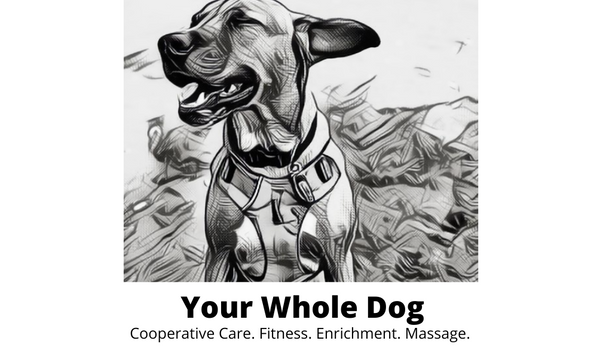
Sniffy Decompression Walks
Why your dog needs sniffy time in nature
Have you ever watched your dog truly relax on a walk?
Not just trotting beside you on a leash, dodging foot traffic, bracing for an unexpected encounter, but really moving. Sniffing freely, exploring at their own pace, and letting their mind and body unwind?
For our city dogs, daily walks are often limited to suburban streets or busy dog exercise areas. These, commonly, can be overwhelming and stressful.
Many behaviour struggles stem from unmet needs. Whether it’s excess energy, frustration, or sensory overload, sniffy decompression walks can help.
They give dogs the freedom to move and process their environment in a way that feels more natural to them. This is why I encourage guardians to rethink their walks and build in more decompression sniffy time. Whether that be in nature or by finding safe, quiet spaces in the city.
Why decompression walks matter
Dogs experience the world through their noses.

Suki, sniffing her sniffs
A walk that allows them to sniff freely is far more enriching than a rushed march along the street. But the benefits go well beyond mental stimulation:
✅ Supports emotional well-being - sniffing lowers a dog’s heart rate and helps them process the environment calmly.
✅ Reduces reactivity and stress - fewer unpredictable encounters mean fewer triggers and more relaxation.
✅ Encourages natural movement - off-leash (or on a long line), dogs can stretch, run, and move in ways that support their physical health.
✅ Promotes confidence and resilience - exploring new scents and moving on different surfaces and textures helps build confidence in nervous, sensitive dogs.
The importance of movement for all dogs
Dogs need to move freely.
Not just for exercise, but for their overall well-being.

The traditional, short-leash walk doesn't allow dogs the full range of movement they need. Over time, these restricted movement patterns can contribute to stiffness, muscle imbalances, and reduced coordination. This is especially important for puppies, senior dogs, and those with mobility challenges.
In contrast, a long-line or off-leash decompression sniffy walk allows dogs to adjust their speed, change direction, and engage their muscles in a balanced, healthy way.
As a canine fitness and mobility trainer, I see firsthand how movement-rich, low-stress outings improve posture, flexibility, and strength. And how they support long-term physical well-being.
When dogs have the freedom to move naturally, they’re not just getting exercise; they’re developing the strength and coordination to feel good in their bodies.
Finding safe spaces in Wellington
I know all too well that in Wellington, good, safe off-leash spaces can be tricky to find.
Many of our popular dog exercise areas are chaotic, and our suburban neighbourhoods don’t provide the freedom dogs need. That’s why I recommend seeking out quiet nature reserves, private parks and SniffSpots (see list at the end), or rural trails where your dog can decompress without the stress of constant interruptions.
That said, while nature is ideal, sometimes we need to get creative with what’s available.
Urban dogs can also find decompression opportunities in less obvious places. Large car parks in retail, industrial, or office complexes - outside of business hours - can be a great option. They provide wide open space, minimal distractions, and plenty of new smells to explore.

These spaces offer a safe, quieter environment for dogs that struggle with overexcitement or reactivity. Here, dogs can practice calm exploration and build confidence without the unpredictability of passing dogs and people.
Suki is a dog that has had struggles with city life.
Her guardians have noticed a real difference since making peaceful sniffy walks in a secluded location a priority.
“We’ve really noticed the calmness that Suki now enjoys due to the sniffing, space, and variation that they provide her with. We’ve found her visits to be an antidote to the parts of city life that stress her out and result in her reactivity; the many other dogs, the small spaces in which she encounters them, the lack of stress-reducing sniffing opportunities, and the inability to concentrate on things that she enjoys.”

If your dog struggles with the hustle and bustle of urban life, a simple shift in their walks - prioritising movement, choice, and sniffing - could make a world of difference. Not only will they be happier and more relaxed, but you’ll likely see improvements in their behaviour, too.
Want to see the difference for yourself?
You don’t need to overhaul your routine. Just a few small changes can have a huge impact.
Start small. Seek out quieter areas, use a long line, and let your dog set the pace.
Over time, these outings might just become the highlight of both your lives.
Private dog parks and SniffSpots available to hire for solo-time, in the Wellington region. Correct as of February 2025:
Goodwood Private Dog Park on SniffSpot is a favourite of ours
Other Wellington-region SniffSpot locations
Zoomie Zone in Upper Hutt
Central Allbreeds Dog Training School grounds in Wilton
Canine Country Club in Wainuiomata
Your Whole Dog's paddocks in Horokiwi - available to YWD clients
